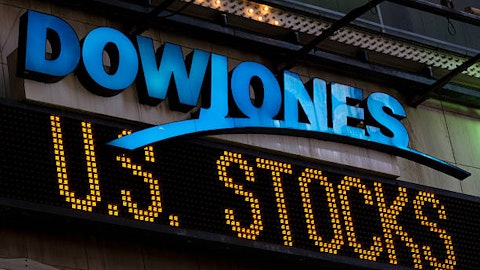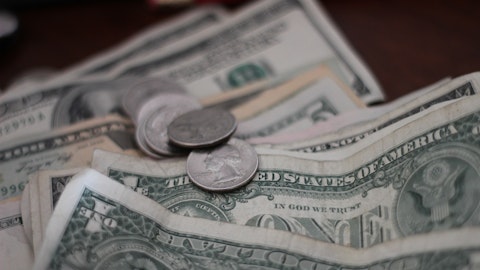In this article, we discuss 11 best low risk stocks to buy in 2022. If you want to see more stocks in this selection, check out 5 Best Low Risk Stocks To Buy In 2022.
Amid the volatile market environment, investors are scurrying to pull out their investments and sit on cash stockpiles, or at the very least, move towards low risk assets. Interest in bonds is increasing as Treasury yields rise. Aggressive rate hikes to control inflation have pushed the S&P 500 into bear territory, and investor sentiment is quite pessimistic as the benchmark S&P 500 has declined about 22% year-to-date as of October 22.
According to Ned Davis Research, a rally in the stock market in 2023 will not be sustainable unless traders do not abandon their investments amid a bear market. NDR’s proprietary trading sentiment composite suggests that the market is in “extreme pessimism” territory, with bearish responses nearing 60% of market participants. The research firm noted:
“Sentiment would need to remain subdued, providing a wall of worry for the market to climb…A quick jump from pessimism to optimism would signal the rally may have run its course.”
Investors seeking safe and solid positions for their portfolios can take a look at firms like Visa Inc. (NYSE:V), Berkshire Hathaway Inc. (NYSE:BRK-B), and Johnson & Johnson (NYSE:JNJ). These businesses deliver resilient returns despite market downturns, have fortress balance sheets which allow them to recover from a hit to corporate earnings, and their customer loyalty keeps the businesses afloat even in the worst macro scenarios.
Our Methodology
We selected the following low risk stocks suitable based on optimistic analyst coverage, strong business fundamentals, and resilient dividend profiles. The betas for these firms were below 1.0 as of October 21, which means these stocks are less risky as compared to the broader market. We have assessed the hedge fund sentiment from Insider Monkey’s database of 895 elite hedge funds tracked as of the end of the second quarter of 2022. These stocks are safe and thus offer good investment options in the current market backdrop.

Image by Sergei Tokmakov Terms.Law from Pixabay
Best Low Risk Stocks To Buy In 2022
11. Shell plc (NYSE:SHEL)
Number of Hedge Fund Holders: 39
Beta Value: 0.72
Shell plc (NYSE:SHEL) is a London-based energy and petrochemical company with operations in Europe, Asia, Oceania, Africa, the United States, and the rest of the Americas. The company runs through Integrated Gas, Upstream, Marketing, Chemicals and Products, and Renewables and Energy Solutions segments. On October 21, Shell plc (NYSE:SHEL) announced that it had resumed export operations from the Forcados oil terminal in Nigeria after a 10-week halt.
On October 13, JPMorgan analyst Christyan Malek reiterated an Overweight rating on Shell plc (NYSE:SHEL) but trimmed the price target on the stock to 2,900 GBp from 3,000 GBp.
According to Insider Monkey’s second quarter database, 39 hedge funds were long Shell plc (NYSE:SHEL), with combined stakes worth $3.46 billion, compared to 37 funds in the prior quarter worth $5.6 billion. Ken Fisher’s Fisher Asset Management is the leading position holder in the company, with 20.25 million shares worth $1.06 billion.
In addition to Visa Inc. (NYSE:V), Berkshire Hathaway Inc. (NYSE:BRK-B), and Johnson & Johnson (NYSE:JNJ), Shell plc (NYSE:SHEL) is one of the best low risk stocks to invest in.
Here is what Harding Loevner International Equity Fund has to say about Shell plc (NYSE:SHEL) in its Q1 2022 investor letter:
“While risks of unforeseen consequences arising from the Ukraine conflict are high, on this front we are cautiously optimistic that China will work hard to maintain its neutrality in a credible way, as it is a huge beneficiary of trade with the rest of the world, especially the rich developed nations. We think it likely that China, along with India, will continue to buy oil and gas from Russia (just as Europe, at least for now, plans to keep its gas pipelines open), and do not expect that fact to alter China’s trade relations with the West much. Nevertheless, we must contemplate that our optimism is misplaced on the importance of membership in the global network of exchange. If our central and optimistic case—admittedly an educated guess—is wrong, then we’d need to greatly modify our views of which companies in our opportunity set will face new barriers to profitable growth, and which might stand to benefit, relatively, from a further receding of globalization. (Global trade, after all, has never matched the peak share of GDP it reached in 2008, before the Global Financial Crisis.) We’d expect such a world to be less efficient, as the cold logic of comparative advantage is demoted as a determinant of which goods or services are produced and where. That would lead to a less prosperous world, since exploiting comparative advantage is a cornerstone of wealth creation. If regional blocs began to raise limits on the movement of capital as well as goods, we’d need to parse which of our multinational companies were at risk of declining sales from increasingly hostile, siloed countries. Royal Dutch Shell (NYSE:SHEL) has found its Siberian oil and gas joint venture assets stranded by the combination of sanctions and the public opprobrium of Russia’s actions.”
10. Costco Wholesale Corporation (NASDAQ:COST)
Number of Hedge Fund Holders: 64
Beta Value: 0.72
Costco Wholesale Corporation (NASDAQ:COST) is an American company engaged in the operation of membership warehouses in the United States, Puerto Rico, Canada, the United Kingdom, Mexico, Japan, Korea, Australia, Spain, France, Iceland, China, and Taiwan. On October 12, Costco Wholesale Corporation (NASDAQ:COST) declared a quarterly dividend of $0.90 per share, in line with previous. The dividend is payable on November 10, to shareholders of the company as of October 28. Costco Wholesale Corporation (NASDAQ:COST) is one of the best low risk stocks to invest in.
On October 5, Baird analyst Peter Benedict reiterated an Outperform rating and a $575 price target on Costco Wholesale Corporation (NASDAQ:COST) after the company’s September sales data. Primary comps of 8.6% were below the earlier six-month average growth rate of 9.6%, but they “remained healthy”, the analyst told investors in a research note.
According to Insider Monkey’s second quarter database, 64 hedge funds were bullish on Costco Wholesale Corporation (NASDAQ:COST), compared to 61 funds in the prior quarter. Ken Fisher’s Fisher Asset Management is the biggest position holder in the company, with 4.3 million shares worth $2 billion.
Here is what Cooper Investors Global Equities Fund has to say about Costco Wholesale Corporation (NASDAQ:COST) in its Q3 2022 investor letter:
“The US economy continues to run hot – the labor market is extremely tight and a number of executives we spoke to described their challenges in retaining staff and preventing competitors from poaching talent. Industrial companies in particular continue to see record backlogs, with the easing of logistics and supply chain constraints only just starting to have an impact on deliveries and lead times.
In terms of inflationary pressures, the vast majority of our holdings have been able to leverage strong market positions and stakeholder relationships to push pricing through in 2022 such that minimal impact to earnings has occurred. Clearly this is not a lever that can be pulled indefinitely but the more experienced management teams have kept some of their powder dry. Our meeting with management at Costco in Seattle was memorable for several reasons but one was their latent ability to increase member pricing which they have not done in over 5 years (and thus likely to do in 2023)…
…To conclude we’ll return to our meeting with Costco mentioned earlier. The business quality is no secret after decades of incredible execution, but the meeting gave us renewed conviction around Value Latencies in terms of the runway for growth, the focus on enhancing customer value, Costco’s vast buying power (it purchases 30% of the world’s jumbo cashews as one example) and management’s feral focus on the business model and cost discipline.”
9. PepsiCo, Inc. (NASDAQ:PEP)
Number of Hedge Fund Holders: 65
Beta Value: 0.57
PepsiCo, Inc. (NASDAQ:PEP) is an American multinational manufacturer and distributor of beverages and convenient foods worldwide. On October 12, the company reported its Q3 2022 results, posting a non-GAAP EPS of $1.97 and a revenue of $21.97 billion, exceeding Wall Street estimates by $0.12 and $1.15 billion, respectively.
For FY2022, PepsiCo, Inc. (NASDAQ:PEP) now expects a 12% increase in organic revenue versus the prior growth outlook of 10%, and total cash returns to shareholders of approximately $7.7 billion, consisting of dividends worth $6.2 billion and share repurchases of $1.5 billion. The core earnings per share are now expected to be $6.73, up from the prior outlook of $6.63 and the consensus of $6.70. PepsiCo, Inc. (NASDAQ:PEP) is one of the best low risk stocks to buy in 2022.
On October 14, Barclays analyst Lauren Lieberman raised the price target on PepsiCo, Inc. (NASDAQ:PEP) to $185 from $183 and maintained an Overweight rating on the shares. The analyst sees the company’s “beat and raise” in Q3 as “firmly characteristic” of its “flexibility that screens all the more attractive in the current operating environment.”
According to Insider Monkey’s data, 65 hedge funds were bullish on PepsiCo, Inc. (NASDAQ:PEP) at the end of Q2 2022, compared to 62 funds in the prior quarter. Terry Smith’s Fundsmith LLP is the leading position holder in the company, with more than 7 million shares worth $1.2 billion.
Here is what ClearBridge Large Cap Value ESG Fund has to say about PepsiCo, Inc. (NYSE:PEP) in its Q2 2022 investor letter:
“Also in the stable and predictable cash flow camp, though with a very different business model, global food and beverage company PepsiCo (NYSE:PEP) reported very strong organic growth in the first quarter, driven by healthy price/mix, and raised revenue guidance, while holding EPS guidance. Notably, its beverage business showed expanding margins.”
8. Walmart Inc. (NYSE:WMT)
Number of Hedge Fund Holders: 67
Beta Value: 0.51
Walmart Inc. (NYSE:WMT), the American multinational retail corporation, is one of the premier low risk stocks to buy in 2022. Morgan Stanley estimated that Walmart Plus added almost 2 million members since an early September estimate, bringing the total to nearly 18.5 million members or a 14.4% U.S. household penetration rate. The standalone value for Walmart Plus could be $45 billion, which is a bigger market cap than Coupang at $37 billion, eBay at $21 billion, Chewy at $16 billion, and Etsy at $14 billion.
Jefferies analyst Corey Tarlowe on October 18 raised the price target on Walmart Inc. (NYSE:WMT) to $165 from $161 and reiterated a Buy rating on the shares. As the value leader in retail, Walmart Inc. (NYSE:WMT) is well positioned in the current environment, particularly as higher-income customers are trading down, the analyst told investors in a research note.
Among the hedge funds tracked by Insider Monkey, 67 funds reported owning stakes worth $3.8 billion in Walmart Inc. (NYSE:WMT) at the end of June 2022, compared to 60 funds in the earlier quarter worth $6.6 billion. Rajiv Jain’s GQG Partners is the biggest stakeholder of the company, with 9.82 million shares worth $1.2 billion.
In its Q2 2021 investor letter, ClearBridge Investments, an asset management firm, highlighted a few stocks and Walmart Inc. (NYSE:WMT) was one of them. Here is what the fund said:
“The pandemic has created challenges for businesses large and small; one major challenge for large essential retailers such as ClearBridge holdings Home Depot, Walmart Inc. (NYSE:WMT) and Costco has been ensuring adequate staffing to meet demand under trying conditions. All three instituted enhanced pay practices during the pandemic, with raises, unplanned bonuses and other benefits helping compensate employees for their efforts in a difficult environment. In September 2020 Walmart raised wages for 165,000 employees, including a number of entry positions to $15 an hour. It followed this in February with a raise for 425,000 workers that moved its average pay above $15 an hour.”
7. AbbVie Inc. (NYSE:ABBV)
Number of Hedge Fund Holders: 71
Beta Value: 0.65
AbbVie Inc. (NYSE:ABBV) manufactures and sells pharmaceuticals worldwide. The company was incorporated in 2012 and is headquartered in North Chicago, Illinois. On October 20, AbbVie Inc. (NYSE:ABBV) announced that it is acquiring the UK-based DJS Antibodies for $255 million in cash to bolster its immunology pipeline. The company will also distribute a per share quarterly dividend of $1.41 to shareholders on November 15. It is one of the best low risk stocks to invest in.
On October 13, Morgan Stanley analyst Terence Flynn kept an Overweight rating and a $185 price target on AbbVie Inc. (NYSE:ABBV) while calling the stock a “Catalyst Driven Idea”, stating that the company’s anti-TNF ADC Phase 2 data could open a new pipeline opportunity.
According to Insider Monkey’s data, 71 hedge funds were bullish on AbbVie Inc. (NYSE:ABBV) at the end of the second quarter of 2022, compared to 76 funds in the prior quarter. Rajiv Jain’s GQG Partners is the largest stakeholder of the company, with 9.82 million shares worth $1.2 billion.
Here is what Baron Funds specifically said about AbbVie Inc. (NYSE:ABBV) in its Q3 2022 investor letter:
“AbbVie Inc. (NYSE:ABBV) is a drug developer best known for Humira, an immunosuppressant that is the best selling drug of all time. Given outsized key product risk (patent cliff and generic launches beginning in 2023), AbbVie has broadened its pipeline, highlighted by its Allergan acquisition. Shares fell on results that missed consensus and indications that legacy franchises were outperforming newer product launches, calling into question AbbVie’s long-term strategy. With promising assets in the pipeline and its robust cash flow profile, we believe AbbVie will grow well into the future.”
6. The Home Depot, Inc. (NYSE:HD)
Number of Hedge Fund Holders: 80
Beta Value: 0.96
The Home Depot, Inc. (NYSE:HD) operates as an American home improvement retailer. The company sells building materials, home improvement products, lawn and garden products, and decor products.
Cowen voiced clear preference for The Home Depot, Inc. (NYSE:HD) as compared to Lowe’s, noting that Home Depot is in a strong position to boost EBIT margins and capitalize and “harvest benefits following its investment cycle” to achieve share appreciation. Analyst Max Rakhlenko initiated coverage of The Home Depot, Inc. (NYSE:HD) with an Outperform rating and a $350 price target on October 19. He is constructive on the firm’s opportunity to gain share, increase sales productivity, and enhance EBIT margin as Home Depot’s Pro ecosystem comes together.
According to Insider Monkey’s second quarter database, 80 hedge funds held stakes worth $5.35 billion in The Home Depot, Inc. (NYSE:HD), compared to 75 funds in the earlier quarter worth $5.6 billion. Ken Fisher’s Fisher Asset Management is the largest stakeholder of the company, with 8.35 million shares valued at $2.3 billion.
Like Visa Inc. (NYSE:V), Berkshire Hathaway Inc. (NYSE:BRK-B), and Johnson & Johnson (NYSE:JNJ), elite investors are piling into The Home Depot, Inc. (NYSE:HD) as a safe haven amid the currently volatile market.
Here is what Diamond Hill Capital specifically said about The Home Depot, Inc. (NYSE:HD) in its Q2 2022 investor letter:
“The Home Depot, Inc. (NYSE:HD) is a high-quality operator in the home improvement industry. Macroeconomic concerns, particularly the rise in mortgage rates, caused the share price to pull back and trade at a greater discount to our estimate of intrinsic value. We believe Home Depot is well positioned to continue gaining share due to its premium real estate locations, strong operations and recent investments in its supply chain. We like Home Depot’s exposure to the professional customer and believe in its ability to take market share in this segment as we believe home improvement spending has the potential to remain resilient in upcoming years.”
Click to continue reading and see 5 Best Low Risk Stocks To Buy In 2022.
Suggested articles:
- 15 Best Single Digit Stocks To Invest In
- 15 Best Ecommerce Stocks To Buy
- 13 Best Long-Term Dividend Stocks To Invest In
Disclosure: None. 11 Best Low Risk Stocks To Buy In 2022 is originally published on Insider Monkey.





